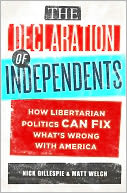Ten thoughts on the fate of the whole embarrassing planet, to hold you over until I resume blogging one week from today:
•Laws against drug use didn’t rescue the talented and troubled Amy Winehouse (who, like the still-living Lindsay Lohan, seemed too battered to be so young – and, by the way, a twenty year-old Fiona Apple sure sounded more aged and experienced than she looked back when she released “Criminal” in 1997, though she did not look well either). For many people, there’s no doubt a temptation to think that even-stricter drug laws might have done the trick, but addicts’ best hope is likely the decentralized and spontaneous intervention of those close to them, and even those quintessential experts – using judgment and sanctions far more nuanced than those the state can devise – may have a tough time inducing change.
•Norway has plenty of gun laws already, in case you were wondering. Side note: as I mentioned on Twitter and Facebook, the Oslo killings, as a portion of national population, are about twice as big as 9/11, the latter killing about 1 in 100,000 people in the U.S. and the former killing about 1 in 50,000 Norwegians (the respective attacks, I mean, not Facebook and Twitter), though obviously with no remotely comparable global-political fallout from the Oslo attack.
•The state can’t – and shouldn’t – be everywhere all the time (and apparently in Oslo it can’t even respond to a shooting in less than ninety minutes sometimes anyway, a reason to consider possessing the means of self-defense). But the panopticon can further the cause of public shaming without being run by the state: Witness Fox Indianapolis’s highly morally-educational photo gallery of passed-out drunk people.
•If the drunks aren't trashy enough for you, note that Beavis and Butt-head are returning to MTV, and Cornholio is now being hailed as a messiah.
•I don’t think I’ve done anything embarrassing enough to worry about being seen by Google Earth, but I did recently have the slightly-unnerving experience of video-cruising around the online version of the Reagan Terrace/Kenwood Ave. area of Austin, TX (in vain) to see if I glimpsed me (and Scott Nybakken) on the road there, since we were walking in the area (visiting recently for the historic Deyo/Hanlon wedding) when passed by the Google Earth Car with its rooftop cameras. Gradually cursoring my way up behind an image of myself would be both cool and creepy – even more so if instead of us it somehow turned out to be Philip K. Dick and Richard Linklater.
•I knew a particularly badly behaved person who hated the idea of the panopticon. I’ll concede that it’s disturbing that the idea of constant surveillance, which we now take to be a characteristic (in principle if not yet in fact) of the entire planet, was something that my philosophical forebear Jeremy Bentham intended to try out solely on a model prison. By this measure, dare I say it, we are becoming a prison planet – no, I don’t mean that one...right, I mean that one, speaking of Austin, TX people with ties to Richard Linklater (though it’s intriguing to hear that the Legion of Super-Heroes, most associated with the first linked prison planet, will be teaming up with the comparably-future-utopian characters of Star Trek in an upcoming comic book miniseries).
•Speaking of comic book characters from the future, with some talk that a couple writers of X-Men: First Class like the badass cyborg character Cable and might like to put him in a film, I’d like to remind everyone roughly what Cable interacting with the future Katherine Pryde (perhaps as she tinkers with salvaged Sentinel technology) might actually look like on film:















